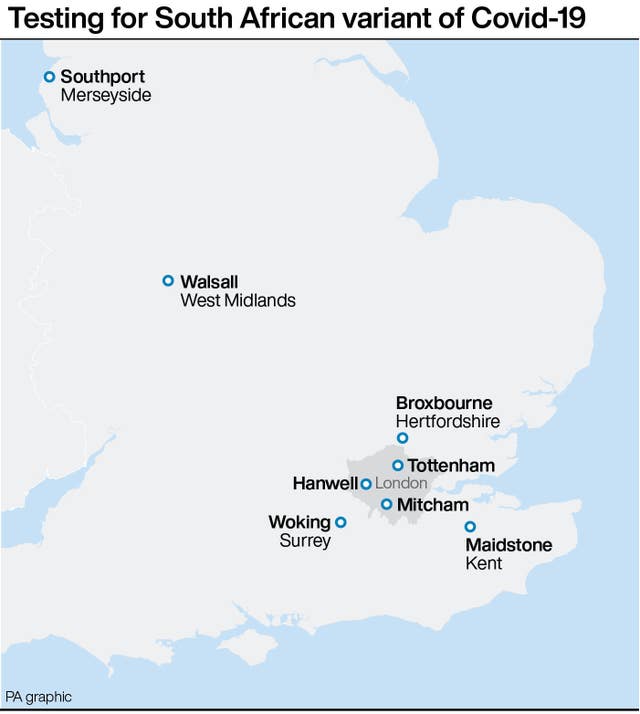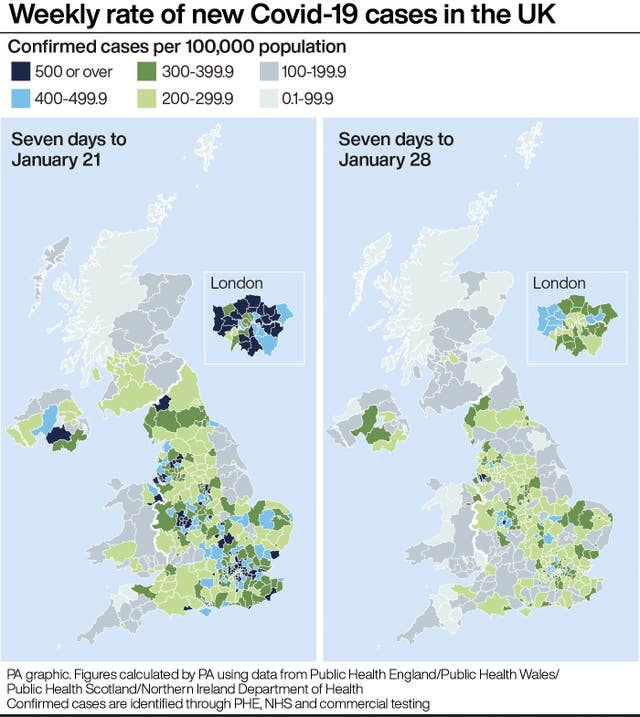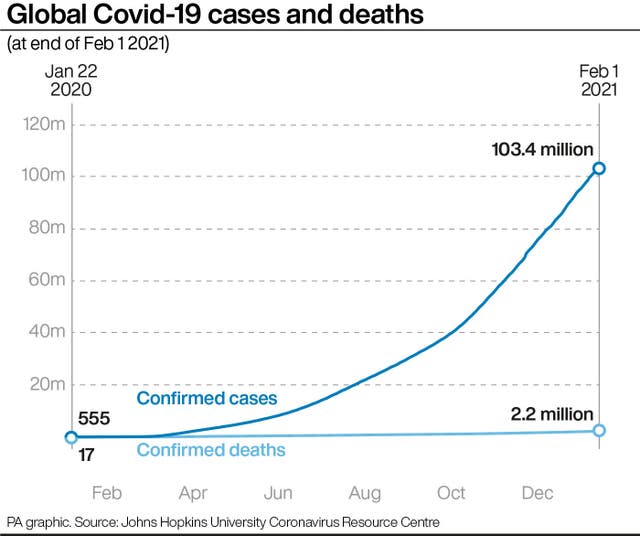Government looking at vaccine effectiveness against variants – Hancock
Public health experts believe current vaccines will still be effective against mutant strains and are good at preventing severe disease.

The Government is working with vaccine firms on tackling coronavirus variants, the Health Secretary has said, as scientists expressed concern that the strain identified in Kent has mutated.
As doorstep testing gets under way in eight areas of England to find cases of Covid-19 caused by the South African variant, experts said some samples of the Kent variant are now showing the E484K mutation.
The South African and Brazilian variants of coronavirus also contain the E484K mutation, which has been shown to reduce the effectiveness of vaccines in preventing people contracting Covid-19.
However, public health experts believe current vaccines will still be effective against these strains and are good at preventing severe disease.
A report from Public Health England (PHE) shows that sequencing has uncovered 11 Kent cases with the spontaneous E484K mutation from 214,159 samples tested.

It comes as:
– First Minister Nicola Sturgeon confirmed that lockdown restrictions in Scotland will remain in force until at least the end of February.
– Boris Johnson told the weekly meeting of Cabinet that plans for relaxing lockdown restrictions in England depended on conditions easing in the health service and the continuing success of the vaccination programme.
– There are 110 care homes across England where the vaccine programme has not yet started due to outbreaks.
– Interim trial results suggested Russia’s Covid vaccine is 91.6% effective against symptomatic coronavirus.
Speaking in the Commons, Mr Hancock said the Government is working closely with pharmaceutical firms in case vaccines need to be tweaked to accommodate new variants.
He said: “We’re working with pharmaceutical companies and with the scientists to understand both whether the such modifications are needed, where they are needed, and how they can be brought to use on the frontline as quickly and safely as possible.
“This is obviously a very important consideration given the new variants that we’ve seen.
“And we have confidence that modifications to vaccines, should they be necessary in large scale, will be available more quickly than the original vaccines.
“And just as we did first time round, when we got in there early and we bought at risk, so we are having exactly the same conversations right now with the pharmaceutical companies to make sure that we are right at the front of this one.”

Mr Hancock told MPs that the aim of community testing for the South African variant – currently targeting around 80,000 people in eight postcode areas – is to “stop its spread altogether”.
He said: “As with the variant first identified here in the UK, there is currently no evidence to suggest it is any more severe but we have to come down on it hard.
“Our mission must be to stop its spread altogether and break those chains of transmission.”
The Cabinet minister also suggested more areas – Bristol and Liverpool – have been added to the list for community testing since the eight postcodes were announced on Monday.
“In those areas where this variant has been found – parts of Broxbourne, London, Maidstone and Southport, Walsall and Woking – we’re putting in extra testing and sequencing every positive test,” he said.
“We have also seen 11 cases of mutations of concern in Bristol and 32 in Liverpool, and are taking the same approach. In all these areas it is imperative that people must stay at home and only leave home where it is absolutely essential.”
Regarding the E484K mutation seen in the Kent variant, Dr Jonathan Stoye, from the Francis Crick Institute, said the PHE report suggests the UK variant is now independently acquiring the E484K change.
“From a virological standpoint, appearance of new variants by mutation during replication cannot be considered surprising,” he added.
“Whether this change will provide significant growth advantages for the novel virus causing it to predominate remains to be seen.”

Dr Julian Tang, honorary associate professor at the University of Leicester, described the finding as “a worrying development, though not entirely unexpected”.
He said it is important that people follow lockdown rules to prevent opportunities for the virus to mutate further, suggesting that allowing spread could provide a “melting pot” for different emerging variants.
“We really need to reduce our contact rates to reduce the opportunities for viral spread (and) replication to reduce the speed with which these different virus variants can evolve,” he added.
Clinical trials for two coronavirus vaccines – Novavax and Johnson & Johnson – have shown the jabs offer some protection against variants with the E484K mutation.
However, they are less effective than against the variant that has been around since the start of the pandemic.
Laboratory studies also suggest vaccines developed by Moderna and Pfizer/BioNtech could work against variants, while variant checks against the Oxford University/AstraZeneca vaccine are ongoing.

Earlier, Andrew Hayward, professor of infectious disease epidemiology at University College London (UCL) and a member of the Scientific Advisory Group for Emergencies (Sage), said a “sustainable strategy” will be needed in the future to tackle coronavirus mutations.
He said that, while it is sensible to try to stamp out chains of transmission of variants, new strains will continue to be a risk and suggested borders cannot stay shut forever.
Asked on Sky News about the probability of more strains entering the UK unless borders are closed completely, or unless all people entering the country are forced into hotel quarantine for 14 days, Prof Hayward said: “Well, probably in the long term, 100%.
“The nature of this virus is that it will continue to mutate, as do all viruses, and new strains will emerge and they’ll emerge in many different countries in the world at different times, and you won’t notice that they are spreading until such time as they are quite widespread.
“The real challenge here is that, well, yes, you can think about completely shutting the borders or having quarantine, (but) what’s the endgame in that?
“Is that something that you’re going to do forever, because it looks like these strains may continue to arise in the long term?
“So we need some sort of sustainable strategy, and I think that’s very difficult for politicians to think about that.”





